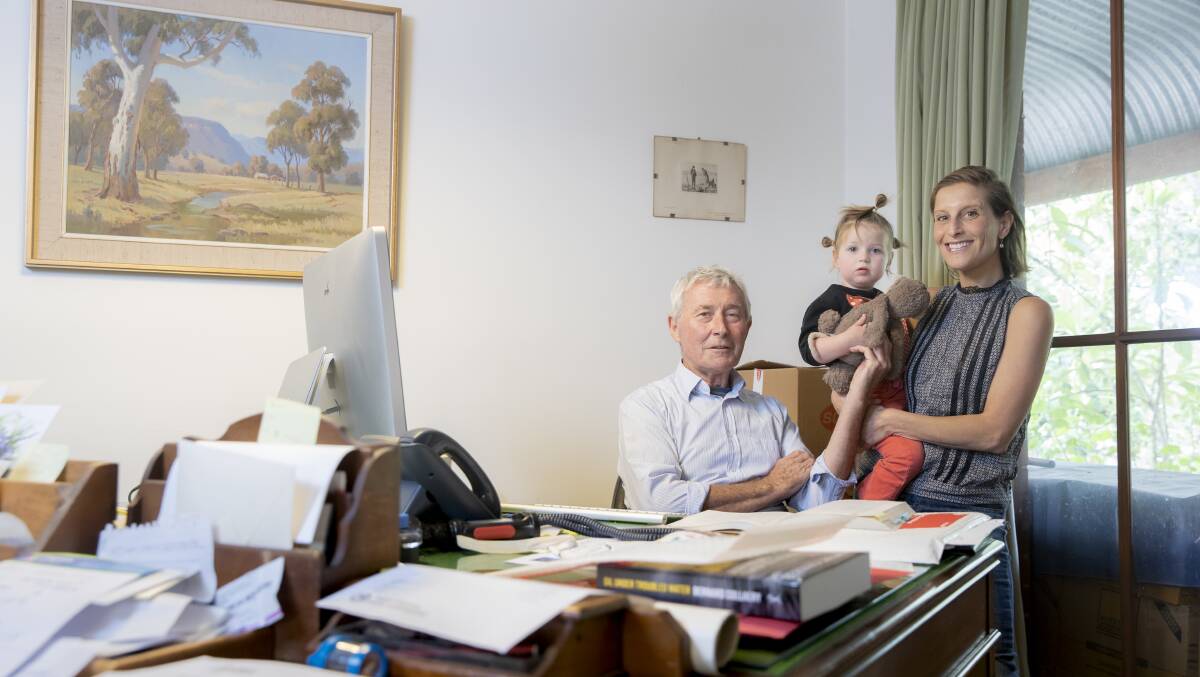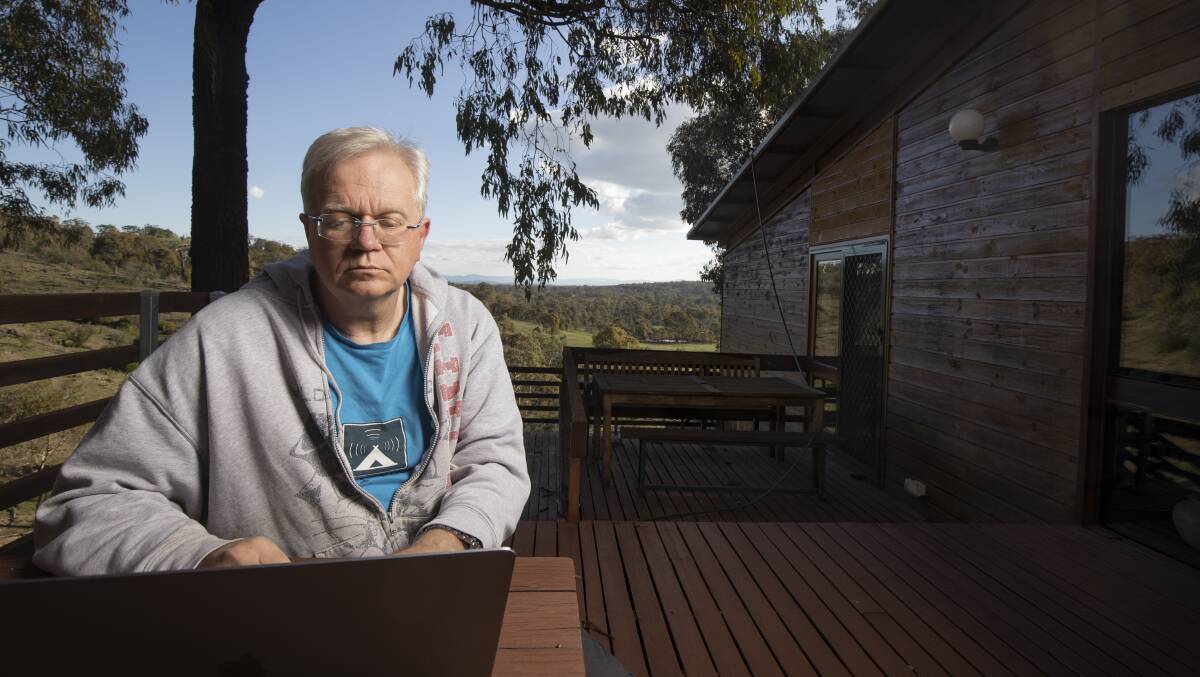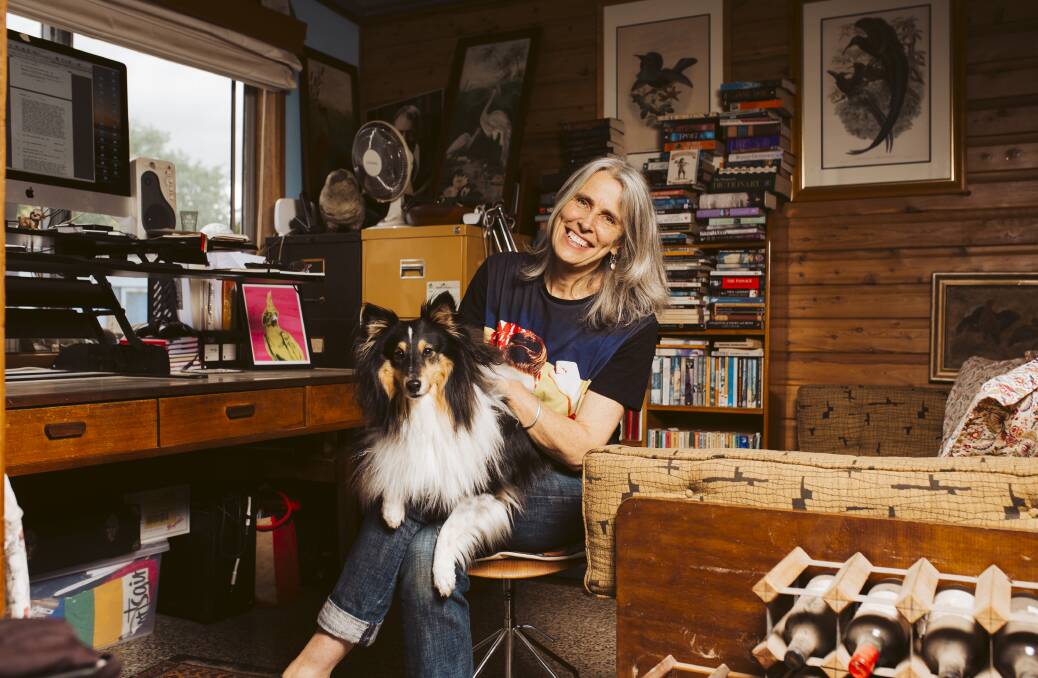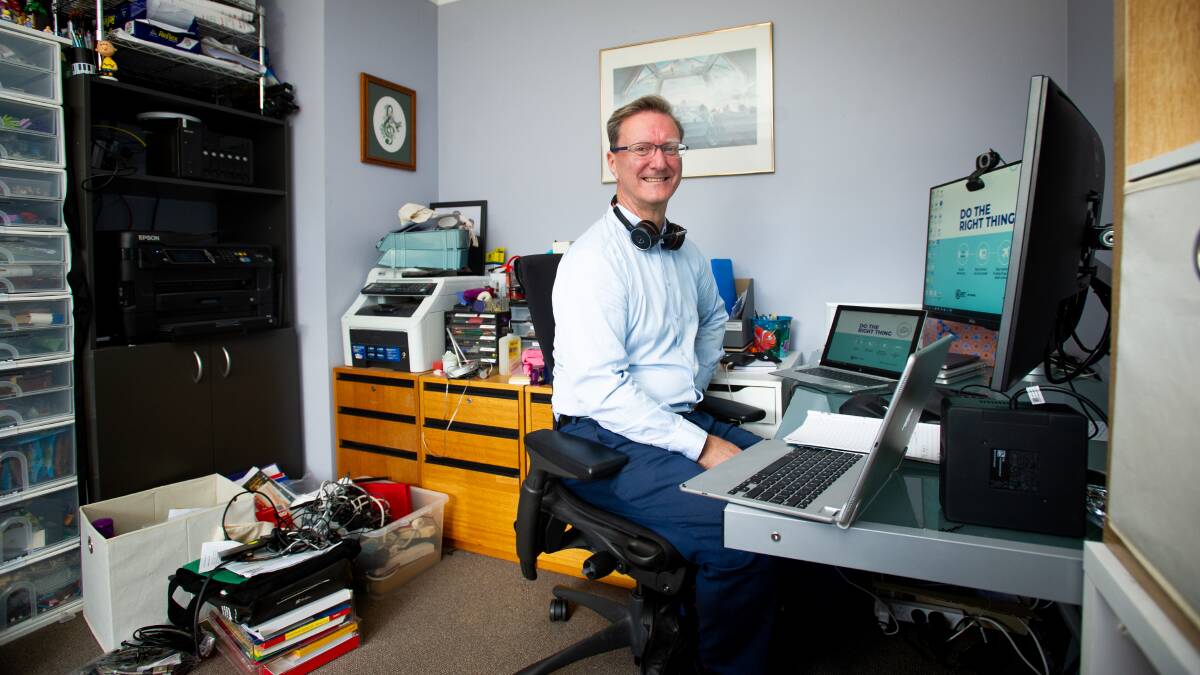
If you're going to be holed up inside for an undetermined period of time it pays to be with people you love, particularly one who's blissfully unaware of the chaos going on outside the fence.
Subscribe now for unlimited access.
or signup to continue reading
Bernard Collaery has bunkered down with partner Pollyanna Clayton-Stamm and her two-year-old daughter Odette.
The lawyer was speaking on radio about his book on the Australian Government's dubious dealings with Timor-Leste when he discovered its Adelaide launch wouldn't go ahead.
South Australian Senator Rex Patrick had been due to give the opening address at the University of Adelaide last Monday. That was, prior to confirmation he had become the fourth politician to test positive for COVID-19.
The Collaery and Clayton-Stamm clan made a beeline to the Narrabundah home that Mr Collaery built, anticipating travel restrictions could keep them apart should Victorians Pollyanna and Odette choose to stay.
While he awaits trial in the Supreme Court later this year, accused by the Australian government of snitching on its spying operation aimed at gaining the upper hand in negotiations over oil and gas reserves in the Timor Sea, Mr Collaery has run his law firm and written Oil Under Troubled Water: Australia's Timor Sea Intrigue from home.
At the timber desk he fails to divulge how he acquired from Old Parliament House, Mr Collaery has kept up with clients this week through all the usual online platforms.
While productivity has flourished with the phone not so noisy, the toddler vying for his attention hasn't shown the same grace.
Bernard and Pollyanna's attempts to entertain have included early morning and late evening rides around Lake Burley Griffin with Odette towed behind in a trailer.
Usually Tuesday lunch would be spent with his granddaughter, but her part-time job at McDonald's was enough for the conscientious teen to stay away.
"'I'd love to but I shouldn't risk you getting sick' she called to say. 'I want to keep you safe'," Mr Collaery said.
Having kept his pact with French military colleagues to never set foot in a McDonalds when one opened in Creteil in 1972, it'd be beyond tragic should one contribute to the pact's demise during all this.
While keeping a safe distance for exercise and chats with the neighbours this week, Mr Collaery said he'd noticed strangers were more eager to meet eyes and smile.
"We've seen quite a few tattooed tradies pushing prams in the middle of the day looking happy. We don't often see that," he said.
"Maybe they'll develop a slightly different style while all this is going on."
Other than one very-ill client who it was necessary to sign guardianship documents for, Mr Collaery has put an end to face-to-face meetings to help stop the virus' spread.
"The beauty of this electronic age is in this emergency situation I am taking messages over the phone. I can prepare documents and send them out electronically. If we didn't have this ability I don't know what we'd do," Mr Collaery said.
He said his work load had changed a bit this week, more clients had called to update wills and check on affairs and he'd missed face-to-face meetups with colleagues at the firm.
"I miss the closeness of it. We usually always have lunch together," Mr Collaery said.
While a legal battle ensues over whether his trial will take place in an open court and the future of all 2020 court proceedings are potentially up in the air, Mr Collaery is enjoying some time at home with the woman he met on a plane 10 years ago and the boisterous toddler who travels by her side.
"In some ways it's a really nice family time for me," Mr Collaery said. "But clearly there's a sad side to it too."
Australian National University vice-chancellor Brian Schmidt

Professor Brian Schmidt says he has had laptops since before most people knew they existed, ever ready to carry on with his research work on the road.
But the Nobel Prize winner has now had to adapt to working at home while running the Australian National University, which he has been doing from his kitchen table.
"There's certainly lots of things I can do, but I spend lots of my time trying to get other people to do things and that's a little more challenging from home," Professor Schmidt says.
His routine is still the same. A 6am wake up, listening to the radio and catching up on what is happening around the world before a walk around the farm he shares with his wife and their animals.
"And then normally I would hop in my vehicle around 7.30am and head into work for an 8am start. Today I started at 7.30am and I have a whole lost of activities and people I need to talk to and they are scheduled," Professor Schmidt says.
"I'm routinely using collaborative software with my team so we can get in and talk and do things more or less as seamlessly as possible. So I'm plugged in at all times. So if anyone needs to get a hold of me, you normally can get a hold of me."
Professor Schmidt got a test run working from home when he needed to self-isolate in recent weeks while waiting for the results of a COVID-19 test. It was easier then, with other staff still in the office.
"Now everyone's at home, so the order of complexity is high and we can see the internet systems are not as stable as they used to be, et cetera, et cetera. It's going to take a little while to get used to it," he says.
The National Broadband Network doesn't reach Professor Schmidt's property and the extra hours spent working from home have been putting pressure on his 4G network.
Professor Schmidt said his usual day was spent working on strategic planning and how the university will look into the future.
"Right now, I'm just trying to make sure things work. So we're very focused on the right here, right now compared to what I normally would be. And so that's a change."
"It's not exactly probably playing to my biggest strengths as a leader, but I'm doing OK, I think, at just keeping the trains on the tracks right now. But it is something all leaders have to do."
Professor Schmidt says researchers and students would find extra time on their hands in the difficult period ahead and he hopes it can be used to work on some of the big questions facing societies around the world.
"We're going to have a chance for people to be very creative. Normally we're just sort of in a rush. We're going to have time to think. So some good things might come out of this."
"I think there are opportunities and I'm intending to do the best to ensure my staff and my students make the most of them while at the same time I'm afraid, coping with the grim reality of what the next several months holds in store for us."
Screenwriter Felicity Packard

From Felicity Packard's desk inside her granny flat in Ainslie she can see into the family home, which isn't usually quite so full of family.
This week, the Underbelly and Anzac Girls screenwriter has seen more of her university aged son who was laid off from his part-time job as a result of coronavirus. She has seen more of her recently returned home adult daughter, and her partner, since she started online lessons from home. While her husband's job at the ABC keeps him out and about, he too is limiting time away.
While most members of the "very Packed to the Rafters" household gesture from outside when it's time for a meal, Ms Packard's granddaughter is less conscious of work and home space boundaries, cutting her teeth as an assistant this week, atop the standing desk.
"She's learnt that she likes to do screenwriting," Ms Packard says.
"She's found symbols and icons with her fists and feet that I didn't know existed on a standard keyboard."
While working on the next season of Ms Fisher's Modern Murder Mysteries and a TV thriller she's keeping a lid on, Ms Packard says no two days are ever really the same.
"I work a lot. I'm still like an adolescent, if I have a deadline I'll work until 2am.
"I try not to work weekends because it drives the family mad - but sometimes I do."
While the main house has been full since Ms Packard's daughter and her young family returned home with their "giant Blue Heeler" to save for a house of their own, the flat out the back is reserved, mostly, for Ms Packard, who has filled it with books, posters and pictures.
Of course, the Shetland sheepdog and the toddler are rarely turned away.
"It's a bit chaotic really," Ms Packard says.
She said before coronavirus began to spread rapidly she had two jobs lined up, one in Adelaide and one in England.
Now, with television production on hold in Australia she is predicting a "long tail on this" for the industry.
"There will be a ripple effect on this for us too."
Member of the Legislative Assembly Gordon Ramsay

Member for Ginninderra Gordon Ramsay anticipates a better harvest from his Latham garden this year, if it's the only positive thing to come from COVID-19.
The family of the Attorney-General gifted him a transformed back lawn as a Christmas present, since the green space was being used less as his two children got older.
Mr Ramsay said while the 11 garden beds returned Spring and Summer crops which were shared around the Legislative Assembly office, the extra time at home was expected to pay off in the way of lettuce, bok choy and garlic.
All four members of the Ramsay household would be home from next week. Mr Ramsay's university-aged daughter continuing her lessons through the Australian National University in one room and his adult son returning from his work away in his IT profession to set up in another.
Having vacated the Legislative Assembly alongside his team of eight on Monday, Mr Ramsay said the family was rotating around various rooms in the house, practising both physical distancing and respecting each other's privacy.
For security reasons, he said he was often required to take calls away from the office he shares with his wife.
While "ironing out the creases" had been necessary during week one of working from home, Mr Ramsay said good Wi-Fi and IT support had ensured his team was now teleconferencing twice a day and getting on with things.
READ MORE:
He said he was enjoying new control over the makeshift office music selection, which varied from classical to U2 and Billy Joel.
"We all noticed this week without the commute and with no traffic that's really freed up more time too," he said.
"One of the important discussions has been to make sure we each take breaks and don't just sit at the desk all day, which is not going to be good for anyone's mental health."
He said his breaks would be out in the garden, where he expects his family will be seeking reprieve from the indoors too.
"We really find a lot of joy in that," he said.
"It's going to be important, not only for me but for all Canberrans I think, to find those things that bring us joy and maintain them."
- For information on COVID-19, please go to the ACT Health website or the federal Health Department's website.
- You can also call the Coronavirus Health Information Line on 1800 020 080
- If you have serious symptoms, such as difficulty breathing, call Triple Zero (000)
We have removed our paywall from our stories about the coronavirus. This is a rapidly changing situation and we want to make sure our readers are as informed as possible. If you're looking to stay up to date on COVID-19, you can also sign up for our twice-daily digest here. If you would like to support our journalists you can subscribe here.



